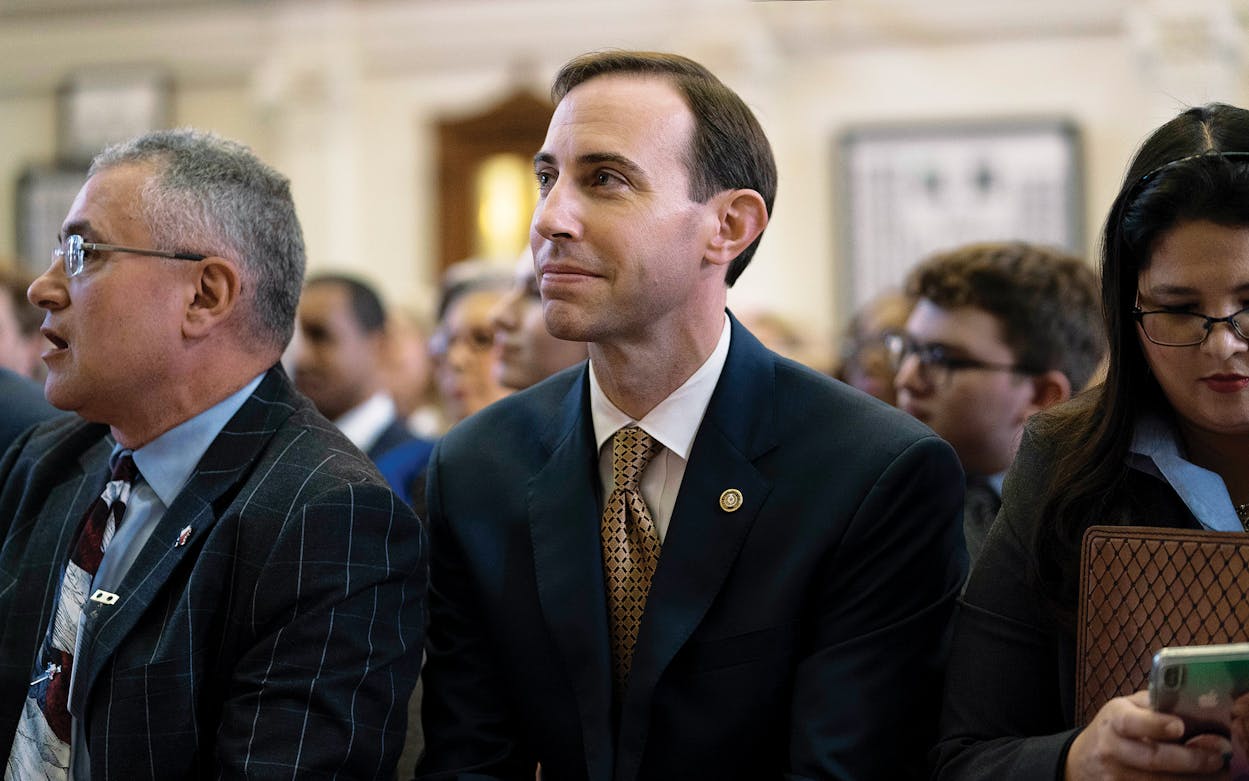In his first public comments on the matter, acting Texas Secretary of State David Whitley last week pledged to cooperate with Congress, which has opened an investigation into his error-laden voter roll review that has Democrats howling voter suppression and has threatened his confirmation as the state’s top election officer. Whitley, on a visit to a school in the Rio Grande Valley, also expressed his confidence that he will ultimately be confirmed by the Texas Senate despite opposition by every Democrat in the chamber.
“I’m not worried about that. Those senators are my friends,” Whitley told reporters after speaking to several hundred students at Edinburg North High School about the importance of voting. Whitley added that he has worked with each state senator over the last four years during his previous job overseeing the governor’s appointments across the state. But now, “all I can do is do the best job I can as secretary of state.”
While fulfilling his duties as the state’s top elections official, Whitley said he will also “fully comply” with the U.S. House Oversight and Reform Committee investigation that was announced a day earlier. “We will fully comply. We have absolutely nothing to hide,” Whitley said. “We’ll read it thoroughly and make sure we turn everything over as required by law. Absolutely.”
In a letter sent to Whitley’s office on Thursday, Oversight and Reform Chairman Elijah Cummings, D-Maryland, wrote that the committee would be investigating “recent efforts by your office to purge voter rolls in Texas.”
“We are disturbed by reports that your office has taken steps to remove thousands of eligible American voters from the rolls in Texas and that you have referred many of these Americans for possible criminal prosecution for exercising their right to vote,” Cummings wrote.
Cummings’ concerns were a far cry from what Whitley told an auditorium full of students on Friday.
“Once you start voting, you need to get out there and keep on doing it,” Whitley said. “Because you really don’t have any reason not to.”
Tens of thousands of Texas voters have been given a reason not to, though. In January, Whitley’s office found that 95,000 registered voters at some point in recent years told the Texas Department of Public Safety that they were not U.S. citizens when they received a driver’s license or ID card. That list, which did not account for voters who later became naturalized citizens, was matched against voter rolls and immediately led to an advisory that noncitizens may have illegally voted in recent elections. The list was delivered to Attorney General Ken Paxton, who could prosecute for voter fraud.
Within days of that January announcement, the state admitted that at least 20,000 people on that list had been removed due to flawed data, and in the weeks that followed, more Whitley missteps were revealed.
But the initial damage had been done, with misinformation spreading across the country. Even President Trump entered the fray, declaring in a tweet that voter fraud was rampant.
58,000 non-citizens voted in Texas, with 95,000 non-citizens registered to vote. These numbers are just the tip of the iceberg. All over the country, especially in California, voter fraud is rampant. Must be stopped. Strong voter ID! @foxandfriends
— Donald J. Trump (@realDonaldTrump) January 27, 2019
Several lawsuits ensued from citizens erroneously included on the list and from voter advocacy groups. Weeks later, a federal judge ordered the state to stop purging the voter rolls. However, earlier this month, Whitley’s office added more people to its already faulty list of voters identified for citizenship reviews. Whitley’s office blamed that latest mishap on a vendor.
Seeing one of his most public appointments going down in flames, Governor Greg Abbott has sought to deflect blame on Whitley by instead laying the blame with the Department of Public Safety and its head, Steve McCraw.
This week, U.S. District Judge Fred Biery, the San Antonio judge overseeing the case, pointed to the state’s ongoing list of blunders.
“Clearly, the unanimity of purpose in having only eligible persons registered to vote cannot occur if the state of Texas and its agencies cannot provide accurate information on which to go forward,” Judge Biery wrote in an order filed on Wednesday.
But none of this came up in Edinburg on Friday. Instead, Whitley sought to relate to the teens in the audience with sports and Star Wars references. Upcoming local elections are to take place on May 4, a date Whitley told students should be easy to remember because May 4 is known as Star Wars Day to fans of the franchise.
He also mentioned high school football, often an easy touchpoint across Texas. Whitley’s own alma mater, not known as a football powerhouse, is only 100 miles north of Edinburg in Alice. There’s “no way that my high school, Alice High School, would have been able to beat you guys in football. I hear you guys are good now.”
The audience broke out in laughter. Edinburg North won two games this past season.
But the students seemed interested in what Whitley had to say, even if they didn’t know who he was at first.
“Who is he?” one student asked a teacher.
“Secretary of state,” the teacher said.
“Oh, secretary,” the student said. “Is he famous?”
Students engaged with Whitley’s questions, and even asked him a couple after his speech. But Whitley got the final word, when the school’s media channel asked him to deliver a message to students before he departed.
“I registered to vote when I was a senior in high school,” Whitley said. “I wasn’t necessarily in the same boat as everybody who was in the room today, because I was in a different town and everybody has different circumstances. But the one thing that is constant is that everybody has a chance to participate in their election.”
- More About:
- Politics & Policy
- Greg Abbott






